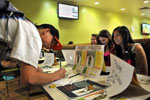
This post originally appeared on Change.org's Human Rights blog.
The world has come to expect seeing U.S. college students on the frontlines of progressive movements over the last 50 years. From the 1960s anti-war movement, to anti-Apartheid organizing throughout the 1980s, to Darfur advocacy, students have mobilized the young masses on issues that other segments of the public view as obscure.
The latest wave of student activism, focusing on ending the trade in Congolese conflict minerals, is no less impressive.
Nearly 30 American schools have taken up the mantle of the Conflict-Free Campus Initiative, coordinated by STAND and The Enough Project’s RAISE Hope for Congo campaign. The initiative aims to pressure electronics companies to take responsibility for the minerals in their supply chain, so that other reforms necessary for ending the conflict can take hold. An online toolkit helps groups get started, but from campus to campus, the actions reflect the creativity of student leaders as well as the constraints they encounter dealing with administrators or trustees.
Students at Stanford University made unprecedented strides earlier this year when they convinced the Board of Trustees to support any shareholder resolution calling on a company Stanford invests in to trace its mineral supply chain. The move made Stanford the first university to adopt a policy on conflict minerals from Congo.
“The proxy voting guideline — a rather complex activism tool that doesn’t easily lend itself to sound bites or slogans — nevertheless represents a powerful statement by the university,” Mia Newman, now-president of Stanford’s STAND chapter, told Change.org at the time.
The conflict in eastern Congo, the deadliest war on earth, hits closer to home when considering the economics behind the war. In the absence of law and order, rebel groups, local militias, and the Congolese army fight for access to Congo’s abundant minerals, to the tune of $180 million per year, according to estimates by The Enough Project. The mineral ores mined in Congo, like tin, tungsten, tantalum, and gold, all end up in electronic devices like cell phones, MP3 players, and laptops.
Click here to continue reading.
Photo: Emiliano Lowe signs a pledge for the group CU Conflict Free at the University Memorial Center at the University of Colorado. (Cameron Redwine/CU)

